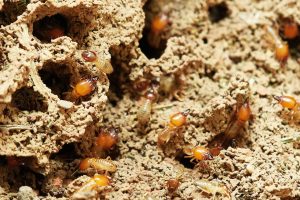
There is a common misconception that termites die or become inactive during the winter. This is not the case. It is true that as seasons change, so do the habits and tendencies of many pests; however, there are still a number of pests that are very active and continue to cause problems
Considering that the Pacific Northwest does experience colder winters than Florida, for example, it is important to take into consideration how termites’ behavior changes during the cold weather season.
Regardless of specific type, termites are happiest at 75 degrees Fahrenheit and will do whatever it takes to achieve this temperature. These nasty bugs are one of those species that do not die or hibernate during the winter but burrow deeper into the ground for warmth.
Why does it seem like termite activity ceases from November to February?
Well, most home and property owners choose to stay inside during these chilly months, which makes them less likely to see signs of termite activity.
While termite queens may reduce egg production or cease altogether, be aware that the colony is still very much alive. As the warmer months come around, you can expect that all reproduction will continue at full force.
All termites need is food, water, and shelter. If you provide the wood or warmth, they are happily comfortable and will continue to build their nests.
If you would like to learn more about subterranean termites, we wrote a whole page about them.
Termite activity can spell disaster for you and your home or property. If you think you are dealing with termites, please give us a call at (360) 506-6033 and let us give you a free estimate.
“Termites”. National Pesticide Information Center. 2018-07-24. Retrieved 2019-12-10.
“Termites: Not Just a Summer Problem”. Action Pest Control. Retrieved 2019-12-10.
